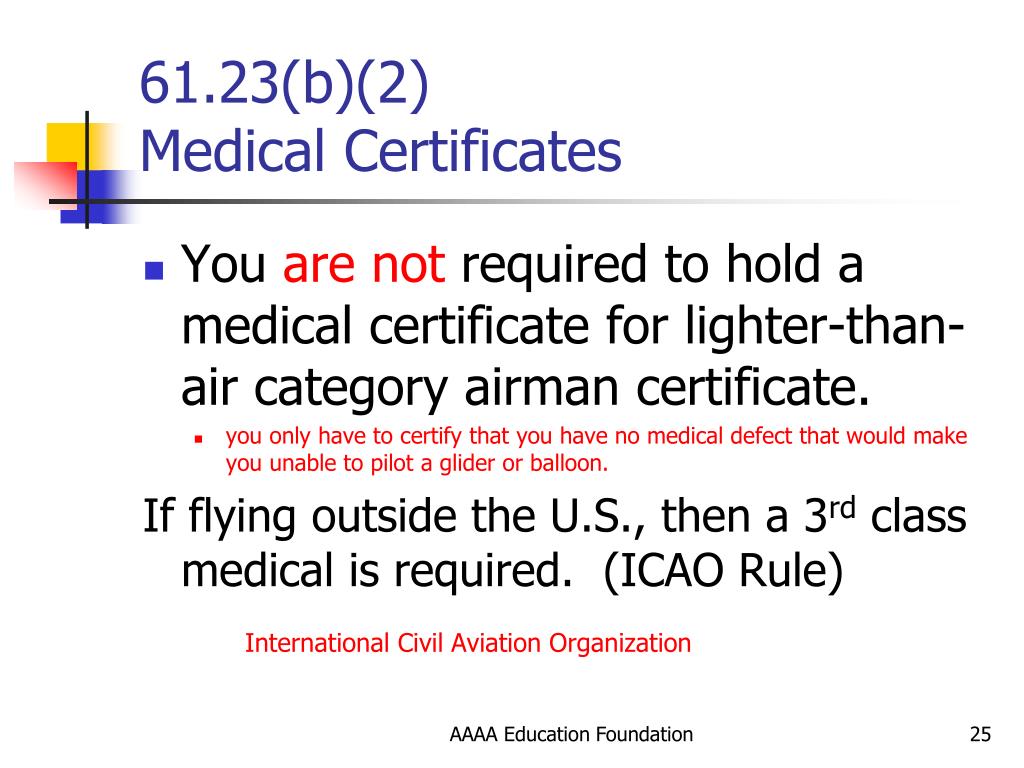


Special Issuance Authorization (SIA) certification for disqualifying medical conditions is authorized by Part 67.401 of the FARs. This will avoid potentially lengthy delays in receiving the certificate and reduce the workload at the very busy AMCD. Pilots with medical problems are strongly encouraged to bring complete documentation of their treatment to an AME who is willing to call the FAA Regional Flight Surgeon or AMCD to obtain clearance to issue the certificate, if appropriate. The pilot’s treating physician should provide the documentation rather than the AME, unless they are the same individual. The Guide also gives considerable leeway for AMEs to issue a medical certificate to pilots with potentially disqualifying conditions if appropriate documentation is provided at the time of application. The Guide to Aviation Medical Examiners contains much more specific information on whether medical conditions require denial of medical certification or deferral of the medical application to the AMCD. Other conditions are automatically disqualifying but not listed such as use of psychoactive medication (such as antidepressants) or use of an Automatic Internal Cardiac Defibrillator. The fifteen mandatory disqualifying medical conditions are angina coronary heart disease that has been treated or, if untreated, has been symptomatic or clinically significant cardiac valve replacement permanent cardiac pacemaker cardiac replacement (heart transplant) psychosis bipolar disorder personality disorder that is severe enough to have repeatedly manifested itself by overt acts substance abuse or dependence (drugs or alcohol) epilepsy disturbances of consciousness without satisfactory explanation of cause and transient loss of control of nervous system function without satisfactory explanation of cause. Fifteen specific medical conditions are specified as disqualifying, although other sections of regulation gives wide latitude to the FAA and designated aviation medical examiners (AMEs) to defer medical certification until additional information about medical conditions is provided to the FAA Aeromedical Certification Division (AMCD), the FAA Office of Aviation Medicine or the Federal Air Surgeon. Part 67 of the FARs defines medical certification standards and Special Issuance Authorizations.

Some pilots granted Special Issuance medical certificate for significant medical conditions may have a time-limited medical certificate that does not automatically lapse to a lower class. Without taking another medical examination, the certificate would be valid for second class privileges through Decemand third class privileges through December 31, 2001. For example, a 42 year old pilot issued a First Class medical certificate on Decemwould be eligible for first class privileges through June 30, 2000. In most cases, a higher class of medical certificate automatically lapses to the next lower class of certificate and is valid for the duration authorized for each class based on the date of application.

airspace only after the 24th month to comply with ICAO regulations. Those who apply for certification prior to their 40th birthday are eligible for a certificate valid for 60 months. Pilots who apply for medical certification on or after their 40th birthday will hold a certificate valid until the end of the 24th month after their applications. The duration of Third Class certification, required for private and recreational operations, varies with the age of the pilot at the time of application. Second Class certification, required for commercial operations, is valid for 12 months. First Class medical certification, required for captain and some international first officer duties, is valid until the last day of the sixth month following the date of issuance of the medical certificate. The duration of each class of medical certificate and type of medical certificate required for specific pilot operations is also defined in FAR Part 61.23. Glider and balloon pilots are excepted and only require a personal statement of freedom from known medical defects that would adversely affect the safe operation of those types of aircraft. Part 61 of the Federal Aviation Regulations requires all airmen performing pilot duties to hold a current, valid medical certificate. Aeromedical Certification (AMCS/DIWS) & FAA Waiver Processing FAA Aeromedical Certification – Regulations


 0 kommentar(er)
0 kommentar(er)
